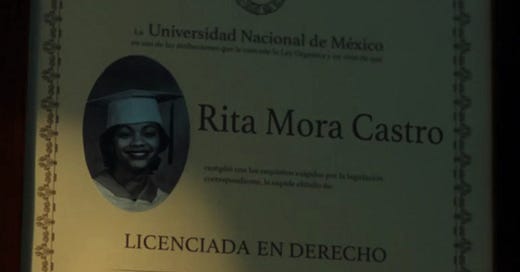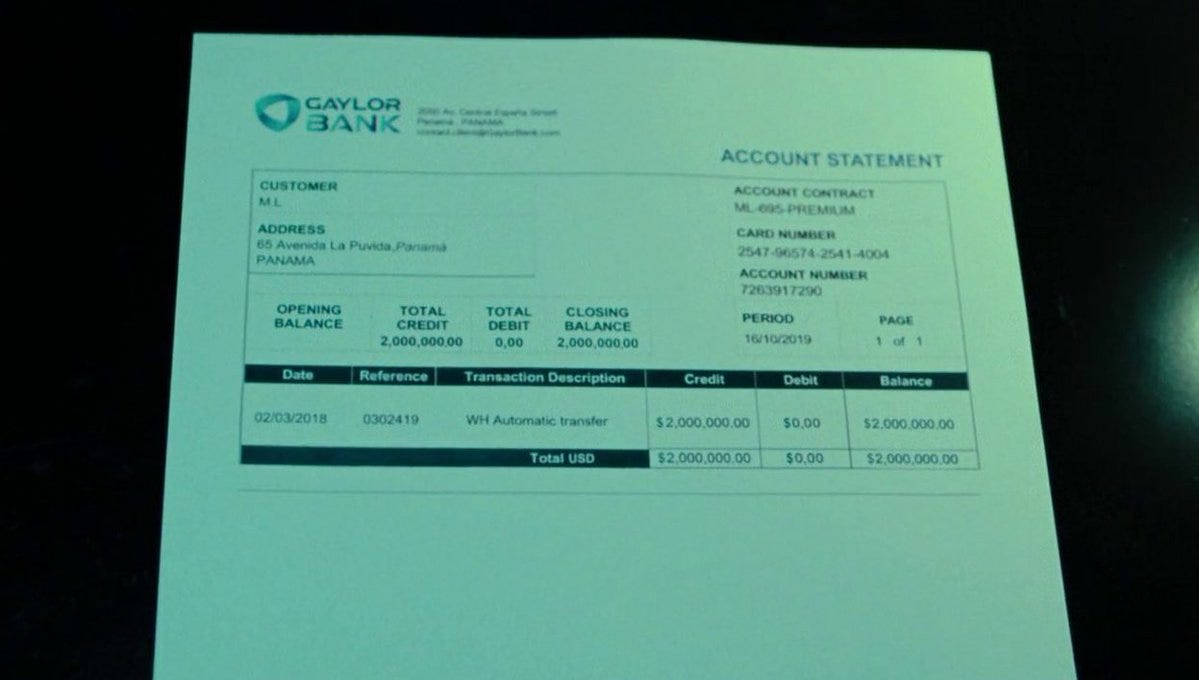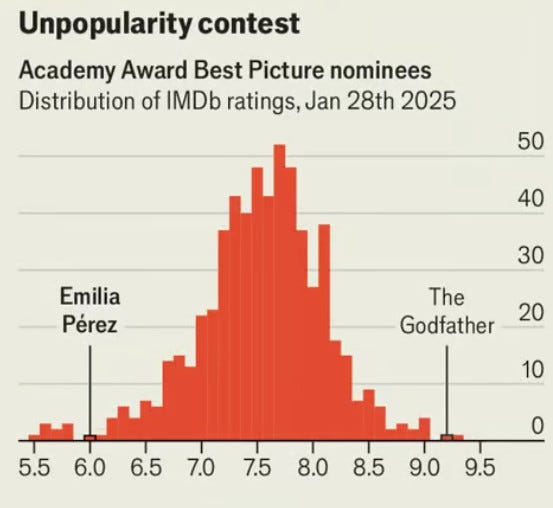Emilia Pérez (the movie) - reviewed
It is often said that only failed moviemakers review movies
The storyline: A Mexican drug lord undergoes sex change to become a different person presumably both physically and psychologically.
The twist: It is told in an operatic musical style.
The trouble: It firmly places itself in Mexico with zero Mexican content.
The insult: It portrays a violent, killer trans person in a sympathetic role.
Executive summary: It is complicated.
The Opening
Jacques Audiard, the French director, made the entire movie in Paris. Yet, right from the start, it lets the audience know that it is about Mexico (not some unnamed Latin American hellhole). We get to see Rita’s bachelor diploma with the name of the UNAM clearly displayed. However, the seal does not anything like the real thing.
The real thing looks like this:
On the other hand, when a bank transaction is shown in the movie, there was a two million dollar transfer to “Gaylor Bank”. It does not exist in Panama or anywhere else in the world.
The question is: Why purposefully malign UNAM but stay away from being “authentic” about banks?
Then we see Rita sitting at a desk with the TV playing in front. It prominently displays CDMX. No Chilango will have any doubt about the implied location.
As if that was not enough, the first sound you hear is what you hear in Mexico City, every day, all day. “Se compran colchones, lavadoras….”.
This singsong wail has become a staple in Mexico City (along with the classic “Hay tamales Oaxaqueños calientitos…”).
Later in the movie, Selena Gomez playing Jessi Del Monte declares that she wants to move to Polanco - a swanky neighborhood of Mexico City. Polanco to Mexico City is what Rodeo Drive is to Los Angeles.
Executive conclusion: The director wanted the audience to know that the events are taking place in Mexico City. A friend of mine, a member of the AMPAS, is exasperated by all this hit on Mexico City, “Ya Basta Wey!”
The Controversy
In Mexico (among the show business people and the LGBTQ+ community), it is seen as an insult to Mexico. Among the main characters Zoe Saldaña, Karla Sofía Gascón, Selena Gomez, Adriana Paz, Édgar Ramírez only Paz is a Mexican actor although Karla Sofía Gascón has lived in Mexico many years undergoing a transition from a man to a woman - in real life. The casting director made it worse by declaring that she could not find enough talent in Mexico. To defend the movie, Karla Sofía Gascón compared the film to Picasso’s Guernica: “Can you imagine if Picasso, after painting Guernica, was criticized for not being from the Basque Country? Ridiculous, isn’t it?”
None of this makes this movie endearing in Mexico. Murders in Mexico (mostly related to drug trade) are showing no signs of slowing down. In the early 2000s, there were 12,000 homicides per year. Now that has ballooned to over 32,000 per year. It is grim.
The movie sits right in the middle of that - straddling between murders, drug lords and mocks it with a musical. Mocking mass murder with a musical outside of Mexico is not unprecedented in Hollywood. Mel Brooks did that in The Producers. To turn Hitler into a musical earned him a lot of brickbats. The original movie was to be called “Springtime for Hitler”.
But that movie was mocking the avarice of Hollywood producers - an inner circle - unlike Emilia Pérez where it is dumped on Mexico - a third country.
Bengali movie director Satyajit Ray was repeatedly criticized in India for highlighting poverty in India through his movies. But, Ray, unlike Audiard, did not pick a different country to pick on.
Not that all Mexicans hated the film. Mexican filmmaker Guillermo del Toro declared "it's so beautiful to see a movie - that is cinema," after watching it.
When Pérez's young son sings about his father - now turned aunt about how he/she smells like his father, comparing it with spicy food, mezcal and guacamole, it really rubbed many Mexicans the wrong way.
They ask: Why should a multimillionaire drug lord smell of those ugly things and not of Hugo Boss?
Suspension of disbelief
The movie requires a suspension of belief about the identity of the sex-changed drug lord. Nobody, including his lawyer, who supervised the gender reassignment, his past wife or anybody else suspected it was *he* who became a *she*. But, then again, as Superman, Clark Kent could not be recognized once he donned his glasses by anyone. So, it is hard to complain on that front.
It was odd in Superman, it was odd in Emilia Pérez. I found the establishment of an NGO devoted to recovering the remains of Mexicans disappeared by cartel-related violence in the movie to be bizarre. After all, Emilia Pérez, as a man, perpetrated exactly those crimes.
Principal Characters of the Movie
Karla Sofía Gascón plays the character of Emilia Pérez - the title role of the movie. Yet, for the first forty minutes of the movie, the character that dominates is Lic. Rita Moreno Castro: Zoe Saldaña was a main character, not just Karla Sofía Gascón. There are two *supporting* actresses in the movie. One is Zoe Saldaña, the other is Selena Gomez. Gomez was also nominated for the Golden Globes. The difference between the two cannot be starker. Saldaña is all over the map in the movie whereas Gomez plays the mousy wife. It seemed like she was trying to play in the spirit of Emma Modesta Coronel Aispuro - the teen beauty queen turned wife of Chapo Guzman. Executive side note: Among the actors in the movie - Gomez is by far the richest - worth over two billion dollars.
The Awards Buzz
Emilia Pérez has created a buzz. It has won 12 nominations for Oscars - highest for any foreign film ever. Similarly, it has 11 BAFTA nominations.
Does that mean it will come out with a swag of Oscars?
No.
To start, a nomination does not mean a win. The best picture is the biggie. You have ten nominations and one win. I would rate this movie very low in the “Best Movie” category.
In the popularity category, it does not rank well.
How did it then manage to win a Golden Globe for the Best Movie?
The Golden Globes have a different category for musicals. So, the number of prizes doubled. Moreover, the voters for the Golden Globes are a very different set of people than those who vote for Oscars (foreign journalists). Last year, the Academy of Motion Picture Arts and Sciences (AMPAS) had approximately 10,910 members, with 9,934 eligible to vote in the Oscars. It is a much bigger number (of mostly Americans). This year, for the Best Picture, they have a rank order voting (not just “pick one”). It is much harder to spring a surprise in that category today.
What it can win
There are three categories in which Emilia Pérez has a good shot of winning the Oscar:
Zoe Saldaña as Rita Mora Castro. She is one of Hollywood’s own. She ticks the box for “diversity”. Make no mistake - she played the part to the hilt. IMHO, she is an almost sure-fire win.
Best International Film. This is another category where the movie stands heads and shoulders over the rest all the critique notwithstanding. Personally, I would like to see “I Am Still Standing” from Brazil to win - the true story of a real life kidnapped person by the military junta - not a made up sex changed drug lord in a musical. But it does not have the other twists that Emilia Perez brings.
The third good shot Emilia Pérez has is in the Best Song category. It is not often you get *two* songs nominated from the same film. Emilia Pérez does. But the song El Mal is by far visually and musically more impactful. https://www.dailymotion.com/video/x995xe4
Executive qualifier: In the past, I have had some success in predicting Oscars. You have to take my predictions with some degree of uncertainty. To wit, if I make ten predictions with a probability of 0.9 (assuming they are independent trials), the chance of getting all ten right is 0.35 - a much diminished figure.
“Il faut parier” -Blaise Pascal
Pascal was talking about the bet in the context of if one should believe in the existence of god (or not).
There is a considerable overlap between the memberships of the AMPAS and BAFTA. So, BAFTA awards will give us a clearer signal about Emilia’s fate at the Oscars. My Oscar predictions will be firmer after the announcement of the BAFTAs.
The Warning
Nominations do not mean wins. Moreover, a nomination in one category does not necessarily produce a strong signal for another. If you want to see a spectacular example of nominated but not won, look no further than the movie: Color Purple. After getting eleven nominations for Oscars, it won none.
Songs from Emilia Pérez: ("El alegato") ("Todo y nada") ("El encuentro") ("La vaginoplastia") ("Lady") ("Deseo") ("Por casualidad") ("Bienvenida") ("Mis siete hermanos y yo") ("Papá") ("Para") ("El mal") ("El amor") ("Mi camino") ("Perdóname") ("Las damas que pasan")










I was unlikely to see the film, and now I definitely won't.
But I will certainly read this review more than once. Tapen packs far too much insight and wisdom into his writing. Once is not enough!